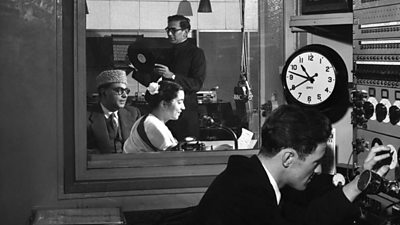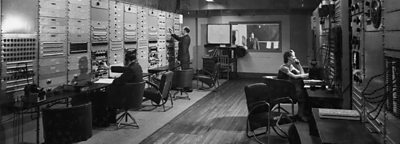The ±«Óãtv Control Room at Bush House on 28th January 1943. All programmes in the ±«Óãtv European and Overseas Services were routed through this room.
Bush House
It has been said that the war made the ±«Óãtv's reputation. It certainly made the ±«Óãtv World Service, in terms of its scale as well as its reputation.
The day war was declared, the Germans made listening to the ±«Óãtv a crime punishable by death. Later in the war, not a single senior German official turned up for the memorial service of a high-ranking officer missing in action. How did they know that the fellow was alive and well in a British PoW camp? Because they had all been listening to the ±«Óãtv.
They weren't alone. Millions of Europeans tuned into English and foreign language services from Britain because they felt unable to trust the information coming out of German-controlled sources. Hitler had declared, in Mein Kampf, that the correct application of propaganda could deliver 'immense results', and he set out to prove this when the Nazis came to power in 1933.
His first targets were German-speakers in North America and Afrikaners in South Africa, whom he saw as potential supporters of his anti-semitic crusade. His Italian allies joined in, beaming anti-British rhetoric to the Arab world, and offering foreign language teaching by radio to listeners in Latin America. Students were invited to translate speeches by the Italian leader Benito Mussolini, and when they sent their work in to be marked, they received Nazi literature by return.
By the mid-30s the UK Government was sufficiently worried to ask the ±«Óãtv to counter-attack with its own foreign language programming, and early in 1938 the ±«Óãtv was broadcasting in Arabic, Spanish and Portuguese to listeners in the Middle East and Latin America.
But the biggest expansion came early in 1940 and 1941, ahead of American involvement in the war, when the outlook for Britain was bleakest. The Government asked the ±«Óãtv to increase its overseas effort three-fold. A special service for North America was introduced, offering entertainment as well as news of the British struggle. There were services in every major European language, from Scandinavia to the Balkans, plus services for the Soviet Union, Persia, India, Japan and many more.
Throughout the war the Corporation endeavoured to issue honest and accurate reports, but it was not all plain sailing. Norwegians, for example, felt betrayed by optimistic reports of the military campaign of 1940 at a time when, unbeknown to the ±«Óãtv, the British were planning to withdraw. Relations with Government were difficult, particularly before the new Ministry of Information got into its stride.
In May 1940 Anthony Eden, Secretary of State for War, complained that the ±«Óãtv Arabic service was 'continually putting out rumours obviously emanating from enemy sources.' Later the service to Yugoslavia discovered to its horror that it was being exploited by local political factions.
Pro-Government spokesmen would turn up too late for their scripts to be checked, and read out the names of people, who it later transpired, had been listed for assassination. Similarly, the Czech service named newspaper editors who were working with the Germans - only to learn that shortly afterwards several were apparently poisoned, one fatally, at a banquet.
But a policy of trying to do the right thing paid off, and the ±«Óãtv won many more friends than it lost. A Finnish member of Parliament said in 1944 that he knew an old lady 'who believes in the Bible and British broadcasts', and a French refugee from Normandy told British officials that the Germans in Cherbourg were all listening to the ±«Óãtv.
As operations expanded, the ±«Óãtv needed extra office space, and early in 1941 the European Service moved into Bush House. As the war progressed, more and more services moved in, and by the end of the war Bush House was, for millions over overseas listeners, the home of the ±«Óãtv.
When war broke out in September 1939 the ±«Óãtv was transmitting in seven languages. At the end of the war there were more than 40 services, and the ±«Óãtv's staff had more than doubled. Joseph Goebbels, Hitler's propaganda minister, acknowledged the success of what he called the 'intellectual invasion of the continent by British radio'.
It was evident that people were listening avidly to the ±«Óãtv. On one occasion, Parisian department stores had queues never before seen for the sale of shoes after the ±«Óãtv announced that the Nazis intended to buy up stocks due to their superb quality.

De Gaulle rallies the French
On 18 June 1940, four days after Paris had fallen, Charles De Gaulle made his first broadcast on the ±«Óãtv French service. He appealed to the 'Free French', among them soldiers who had been evacuated with the British forces from Dunkirk, to rally under his command, and urged the French nation to continue its resistance. From London, communicating largely through the ±«Óãtv, De Gaulle marshalled nine separate resistance networks and a resistance army estimated to number 56,000.
To his fury, De Gaulle discovered that his historic address of 18 June had not been recorded by the ±«Óãtv. He insisted on repeating the broadcast four days later. This time it was recorded, and the recording has recently been included in the UNESCO Memory of the World Register.
German Service rejects peace offers
Shortly before the outbreak of war, Hitler offered a peace deal to Britain. He got his response even before the British Government had considered it. Maurice Latey, working on the German Service, poured scorn on the offer. The next morning Latey read newspaper headlines announcing: '±«Óãtv rejects Hitler peace offer'. He recalled: 'I approached the office in fear and trembling, only to find on my desk a note from my boss congratulating me on my effort.'
Hitler made another offer, after the fall of Paris, with the same result. Sefton Delmer acknowledged the offer on air, and replying: 'Herr Führer and Reichskanzler, we hurl it right back at you, right in your evil-smelling teeth.'
The V Campaign
The ±«Óãtv engaged in overt propaganda with its extraordinarily successful V-For-Victory campaign. The Belgian Service started it, exhorting listeners to adopt the V-sign as a rallying emblem. Soon the whole of the European Service had joined in, and with them audiences across the Continent. Placards and posters and chalked Vs appeared everywhere.
The morse code for V - three dots and a dash - was replicated by the opening bars of Beethoven's Fifth Symphony. It soon became the European Service's call sign and interval sign. Across Occupied Europe people hummed and whistled the tune, and in Britain the V made its way onto badges and other items. Prime Minister Churchill made the sign his trademark.
At first the Nazis were enraged by the campaign but, in the end, recognising that they couldn't win, they adopted it as their own, putting a V on the Eiffel Tower, and renaming one of Prague's main thoroughfares Victoria Street.
